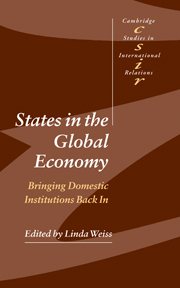Book contents
- Frontmatter
- Contents
- List of figures
- List of tables
- List of contributors
- Preface
- 1 Introduction: bringing domestic institutions back in
- Part I The resilience of welfare states
- Part II New economic challenges, changing state capacities
- 5 France: a new ‘capitalism of voice’?
- 6 The challenges of economic upgrading in liberalising Thailand
- 7 Building institutional capacity for China's new economic opening
- 8 New regimes, new capacities: the politics of telecommunications nationalisation and liberalisation
- 9 Ideas, institutions, and interests in the shaping of telecommunications reform: Japan and the US
- 10 Diverse paths towards ‘the right institutions’: law, the state, and economic reform in East Asia
- Part III Governing globalisation
- List of references
- Index
- CAMBRIDGE STUDIES IN INTERNATIONAL RELATIONS
6 - The challenges of economic upgrading in liberalising Thailand
Published online by Cambridge University Press: 22 September 2009
- Frontmatter
- Contents
- List of figures
- List of tables
- List of contributors
- Preface
- 1 Introduction: bringing domestic institutions back in
- Part I The resilience of welfare states
- Part II New economic challenges, changing state capacities
- 5 France: a new ‘capitalism of voice’?
- 6 The challenges of economic upgrading in liberalising Thailand
- 7 Building institutional capacity for China's new economic opening
- 8 New regimes, new capacities: the politics of telecommunications nationalisation and liberalisation
- 9 Ideas, institutions, and interests in the shaping of telecommunications reform: Japan and the US
- 10 Diverse paths towards ‘the right institutions’: law, the state, and economic reform in East Asia
- Part III Governing globalisation
- List of references
- Index
- CAMBRIDGE STUDIES IN INTERNATIONAL RELATIONS
Summary
Thailand's spectacular economic performance until the mid-1990s earned it classification as one of the World Bank's ‘High Performing Asian Economies’ (World Bank 1993). In 1997, however, the country's financial meltdown triggered the Asian crisis. Analysts may differ as to the precise explanations for Thailand's economic performance, but all would agree that globalisation, in the form of significant and increasing exposure to regional and global markets for goods, services, and capital, has played a significant role in the country's successes as well as its problems. This chapter uses the case of Thailand to explore the impact of domestic institutions on economic upgrading efforts in the face of globalisation, with an emphasis on globalised product markets. More specifically, we highlight the necessity of market-conforming, domestic arrangements capable of resolving sector-specific and intersectoral coordination and distributional dilemmas inherent in economic upgrading. In this perspective, recent neoliberal calls for sector-neutral institutional strengthening are useful but insufficient for middle-income developing countries to advance in a more globalised environment.
Our emphasis on the real sector is not meant to minimise the weight of problems in Thailand's financial sector. But the financial crisis was itself in part a function of weaknesses in the real sector – of ‘too much foreign money chasing too few sound investments that were capable of earning foreign exchange sufficient to service the principal and interest on the debt’ (Jackson 1999: 5).
- Type
- Chapter
- Information
- States in the Global EconomyBringing Domestic Institutions Back In, pp. 121 - 141Publisher: Cambridge University PressPrint publication year: 2003
- 7
- Cited by

